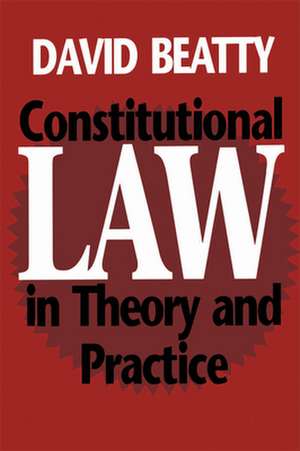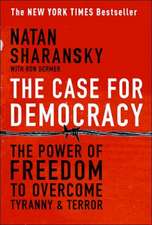Constitutional Law in the Ory and Practic
Autor David M. Beattyen Limba Engleză Paperback – 14 dec 1995
David Beatty draws on more than twenty years' teaching experience to produce a comprehensive introduction to the basic rules in constitutional law, accessible to law and non-law students alike. He reviews the leading cases handed down by the Supreme Court of Canada and the Privy Council concerning the original BNA Act of 1867 and the Canadian Charter of Rights enacted in 1982. As well, Beatty reviews many of the most important decisions made by other courts around the world and analyses the function judges and courts perform in liberal democratic societies when they enforce written constitutions including bills of rights.
The initial chapter introduces the reader to the subject of constitutional law - what it is all about, what its function is, and how it interacts with the constitutional text. The book goes on to examine Canadian federalism law and the Supreme Court of Canada's experience in the first decade in the life of the Charter of Rights. Beatty also examines significant human rights cases decided by the major courts around the world, in order to illustrate how the same principles and methods of reasoning are used to resolve disputes about the validity of laws no matter what the issue is or where it arises. The book concludes by showing how a theory of constitutional law which emphasizes the social duties which politicians must respect rather than individual rights should be responsive to the concerns of those who are more sceptical about the virtues of law and the courts as well as those who fear the cultural imperialism of western legal concepts.
Beatty proposes a radically new way to think about the idea of 'rights, ' one which emphasizes the social duties that are inherent in every conception of rights. The book argues that by reorienting our thinking about what rights and the rule of law are all about, it is easier to see that rather than being in conflict or tension with each other, democratic decision making and judicial review are supportive of a common set of values and ideals.
Preț: 306.56 lei
Nou
58.66€ • 61.37$ • 48.73£
Carte tipărită la comandă
Livrare economică 02-16 aprilie
Specificații
ISBN-10: 0802076505
Pagini: 204
Dimensiuni: 153 x 229 x 18 mm
Greutate: 0.34 kg
Ediția:2
Editura: University of Toronto Press






















